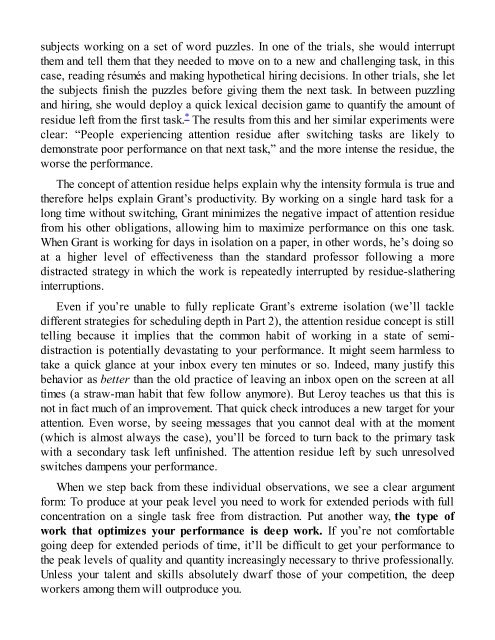Deep Work_ Rules for focused success in a distracted world ( PDFDrive.com )
Create successful ePaper yourself
Turn your PDF publications into a flip-book with our unique Google optimized e-Paper software.
subjects work<strong>in</strong>g on a set of word puzzles. In one of the trials, she would <strong>in</strong>terrupt<br />
them and tell them that they needed to move on to a new and challeng<strong>in</strong>g task, <strong>in</strong> this<br />
case, read<strong>in</strong>g résumés and mak<strong>in</strong>g hypothetical hir<strong>in</strong>g decisions. In other trials, she let<br />
the subjects f<strong>in</strong>ish the puzzles be<strong>for</strong>e giv<strong>in</strong>g them the next task. In between puzzl<strong>in</strong>g<br />
and hir<strong>in</strong>g, she would deploy a quick lexical decision game to quantify the amount of<br />
residue left from the first task. * The results from this and her similar experiments were<br />
clear: “People experienc<strong>in</strong>g attention residue after switch<strong>in</strong>g tasks are likely to<br />
demonstrate poor per<strong>for</strong>mance on that next task,” and the more <strong>in</strong>tense the residue, the<br />
worse the per<strong>for</strong>mance.<br />
The concept of attention residue helps expla<strong>in</strong> why the <strong>in</strong>tensity <strong>for</strong>mula is true and<br />
there<strong>for</strong>e helps expla<strong>in</strong> Grant’s productivity. By work<strong>in</strong>g on a s<strong>in</strong>gle hard task <strong>for</strong> a<br />
long time without switch<strong>in</strong>g, Grant m<strong>in</strong>imizes the negative impact of attention residue<br />
from his other obligations, allow<strong>in</strong>g him to maximize per<strong>for</strong>mance on this one task.<br />
When Grant is work<strong>in</strong>g <strong>for</strong> days <strong>in</strong> isolation on a paper, <strong>in</strong> other words, he’s do<strong>in</strong>g so<br />
at a higher level of effectiveness than the standard professor follow<strong>in</strong>g a more<br />
<strong>distracted</strong> strategy <strong>in</strong> which the work is repeatedly <strong>in</strong>terrupted by residue-slather<strong>in</strong>g<br />
<strong>in</strong>terruptions.<br />
Even if you’re unable to fully replicate Grant’s extreme isolation (we’ll tackle<br />
different strategies <strong>for</strong> schedul<strong>in</strong>g depth <strong>in</strong> Part 2), the attention residue concept is still<br />
tell<strong>in</strong>g because it implies that the <strong>com</strong>mon habit of work<strong>in</strong>g <strong>in</strong> a state of semidistraction<br />
is potentially devastat<strong>in</strong>g to your per<strong>for</strong>mance. It might seem harmless to<br />
take a quick glance at your <strong>in</strong>box every ten m<strong>in</strong>utes or so. Indeed, many justify this<br />
behavior as better than the old practice of leav<strong>in</strong>g an <strong>in</strong>box open on the screen at all<br />
times (a straw-man habit that few follow anymore). But Leroy teaches us that this is<br />
not <strong>in</strong> fact much of an improvement. That quick check <strong>in</strong>troduces a new target <strong>for</strong> your<br />
attention. Even worse, by see<strong>in</strong>g messages that you cannot deal with at the moment<br />
(which is almost always the case), you’ll be <strong>for</strong>ced to turn back to the primary task<br />
with a secondary task left unf<strong>in</strong>ished. The attention residue left by such unresolved<br />
switches dampens your per<strong>for</strong>mance.<br />
When we step back from these <strong>in</strong>dividual observations, we see a clear argument<br />
<strong>for</strong>m: To produce at your peak level you need to work <strong>for</strong> extended periods with full<br />
concentration on a s<strong>in</strong>gle task free from distraction. Put another way, the type of<br />
work that optimizes your per<strong>for</strong>mance is deep work. If you’re not <strong>com</strong><strong>for</strong>table<br />
go<strong>in</strong>g deep <strong>for</strong> extended periods of time, it’ll be difficult to get your per<strong>for</strong>mance to<br />
the peak levels of quality and quantity <strong>in</strong>creas<strong>in</strong>gly necessary to thrive professionally.<br />
Unless your talent and skills absolutely dwarf those of your <strong>com</strong>petition, the deep<br />
workers among them will outproduce you.



